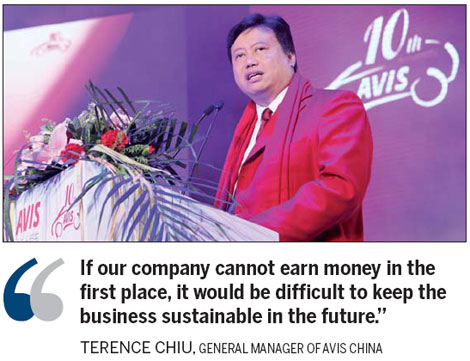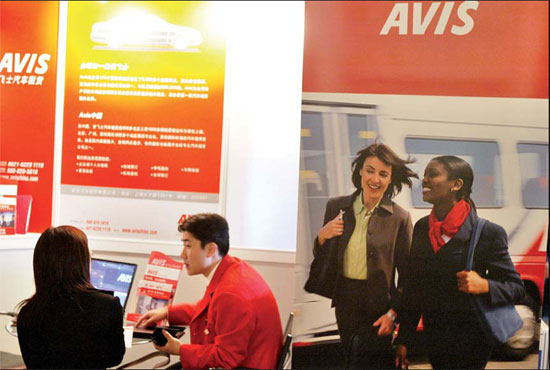Avis does a balancing act in China
Updated: 2013-02-01 07:53
By Wang Chao (China Daily)
|
||||||||
|
Avis Car Rental considers China a market that is full of potential. Photos provided to China Daily |
Local habits and a lack of regulation put the car rental company to the test
This year marks the 10th anniversary of Avis Car Rental's arrival, and it seems to be belting up for many more years on the road in China, but its long march through the nation has only just begun.
Ten years ago the company teamed up with Shanghai Automotive Industry Sales Corp, a vehicle distributor, and began exploring the Chinese car rental market, which at that time was an alien concept to the nation.
Since then, the company's division in China has grown by leaps and bounds. It is now in 178 locations in 41 cities, with a fleet of more than 7,000 cars.
But its business in China is a mere fraction of its global business, says Terence Chiu, general manager of Avis China.
Chiu says its divisions in North America, Western Europe and Australia account for the majority of its total business volume.
Established in 1946 at Willow Run Airport in Detroit, Avis Car Rental operates at more than 10,000 locations in 175 countries. The company owns a fleet of 500,000 cars worldwide.
In the company's eyes, China is an emerging market ripe with possibilities. Figures from the traffic management bureau of China's Ministry of Public Security show that by June of last year, 180 million people in China had driver's licenses, though there were only 100 million registered cars, which means nearly 80 million eligible drivers don't have a vehicle to call their own.
"This presents great opportunities to foreign car rental companies," Chiu says.
In the past two years Avis has taken advantage of these opportunities, and business from individual customers has quadrupled.
Figures from Roland Berger Strategy Consultants show that by 2011 there were 215,000 cars for rent in China. Last year revenue from the car rental industry reached 22 billion yuan, with only 6 billion yuan from the individual car rental market and the rest from long-term leasing contracts with companies and local governments.
Roland Berger projects growth of 18 to 19 percent a year for the industry in the near future.
Many Chinese car rental companies are now in debt, experts say, but many are looking to claim more market share by expanding to more locations and offering lower prices.
For example, some are offering rental prices as low as 99 yuan ($16; 12 euros) a day, a pittance compared with the company's expenses in buying cars as well as the costs of staffing and daily maintenance.
However, Avis, is taking a different approach. For the past few years, it has turned a profit in China because of stable revenue from corporate clients, which account for most of its customer base.
The company says it will not sacrifice profit margins to gain a greater market share, but it has tried to attract customers through other offers, such as free GPS or safety seats for children. Compared with its Chinese competitors, Avis is seemingly conservative, in expanding its business in China.
However, its competitors are rapidly trying to scale up. China Auto Rental, for instance, says it had a fleet of 45,000 cars by the end of last year, having owned only 700 three years ago.
But Chiu says scale is not the company's priority. "If our company cannot earn money in the first place, it would be difficult to keep the business sustainable in the future."
Fortunately, the Chinese market is huge.
"There are several car rental companies in the US, all earning decent money," says Zhang Ruiping, president of eHi Car Service.
"And it is good to have some companies (in China) to educate the public. We welcome competition, which provides more options for our customers."
Chiu also says that Avis welcomes the competition, but adds that he does not think the market will be that complicated. In China, he says, the habits of consumers are vastly different from those in the US and Europe.
"As most people in Europe or in the US have their own cars, they generally rent cars between Monday and Friday, during their business trips out of town, and at weekends they drive their own cars. In China, the situation is completely reversed."
Most Chinese rent cars during the weekends when they drive out of town for outings.
"That creates an embarrassment that during the week, cars are idling, but on weekends our supply cannot meet the demands," Chiu says.
He says Avis is now balancing the number of cars it rents to meet demand.
Outside China, in mature markets, car rental companies are signing contracts with manufacturers with a guarantee that the manufacturers promise to buy back the vehicles after the cars are decommissioned. These cars are then sold in the used-car market.
But in China, the new car market is still growing at a rate above 7 percent every year, which offers little incentive for car makers to work with car rental companies because the margins are lower.
"The best we can expect is to get a bigger discount when purchasing from them," Chiu says.
Lack of visibility and a dearth of parking lots in public places is another problem. Many car rental companies complain that the government does not support the car rental business in providing infrastructure for them.
Apart from that, some car rental companies China Daily spoke to say they have to worry about customers returning a different car from the one they rented.
This, which wastes companies' time and human resources, rarely happens in Western nations, Chiu says.
wangchao@chinadaily.com.cn

(China Daily 02/01/2013 page16)

 Li Na on Time cover, makes influential 100 list
Li Na on Time cover, makes influential 100 list
 FBI releases photos of 2 Boston bombings suspects
FBI releases photos of 2 Boston bombings suspects
 World's wackiest hairstyles
World's wackiest hairstyles
 Sandstorms strike Northwest China
Sandstorms strike Northwest China
 Never-seen photos of Madonna on display
Never-seen photos of Madonna on display
 H7N9 outbreak linked to waterfowl migration
H7N9 outbreak linked to waterfowl migration
 Dozens feared dead in Texas plant blast
Dozens feared dead in Texas plant blast
 Venezuelan court rules out manual votes counting
Venezuelan court rules out manual votes counting
Most Viewed
Editor's Picks

|

|

|

|

|

|
Today's Top News
Boston bombing suspect reported cornered on boat
7.0-magnitude quake hits Sichuan
Cross-talk artist helps to spread the word
'Green' awareness levels drop in Beijing
Palace Museum spruces up
First couple on Time's list of most influential
H7N9 flu transmission studied
Trading channels 'need to broaden'
US Weekly

|

|








